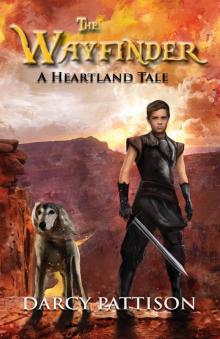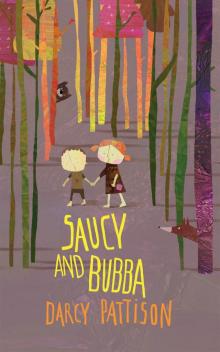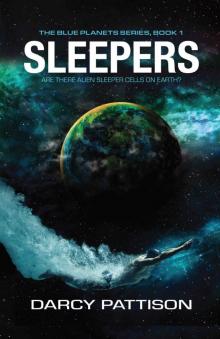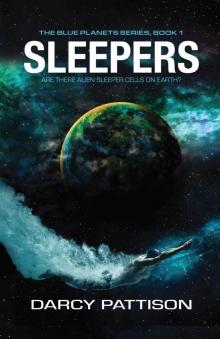- Home
- Darcy Pattison
Sleepers (The Blue Planets World series Book 1) Page 12
Sleepers (The Blue Planets World series Book 1) Read online
Page 12
She’d stayed right with him as they chased Captain Hill, and she’d urged him to get back to the bus quickly. If he’d been human and he really had hypothermia, her instincts were all correct. Beautiful, with that gleaming smile, and steady in an emergency. The more he was around her, the more he liked her.
Jake thought about his Earth culture class, one of the few classes that Swann and his tutor had insisted he attend with others his age. The class had watched a British television show called, “Yes, Prime Minister.” One of the hardest things about learning a new language is understanding the slang or metaphors that people used. That show had gone into a funny explanation of “need-to-know.” In a complicated play on words, it wound up saying that important people need to know things even when they didn’t need to know; otherwise, how would they know if they needed to know?
Mom didn’t need-to-know, he decided.
Still, the next morning, Easter insisted that Jake call Mom. She set a plate of blueberry pancakes in front of him and said, “She’ll want to hear that you fell into Bench Lake, how it happened, and—most importantly—that you’re okay. Best to get it done.”
After breakfast Jake put in a vid-call to his Mom and explained that he’d been roughhousing with someone and accidently got pushed into the water. “It was an accident. But Mom, the water was so pure. I’d love a house on a lake like that.”
She bought it.
Which scared him. As much as he wanted to not worry his parents, the weight of what Captain Hill might have done—the damage he may have created by trying to awaken Mt. Rainier—was entirely on him to handle. He wanted to be on his own, but now, he was on his own! And he didn’t like it.
But he squared his shoulders and told himself, “Need-to-know basis.”
The Seal Pup
That Saturday, the first weekend in October, Jake set his alarm for 5 a.m. By 6 a.m., he pulled his bicycle up at the harbor to meet the biologist, Bobbie Fleming.
Though it was still dark, the sculling teams were already there, carrying the long, skinny boats into the harbor. The girl’s team was efficient, ready for action; the boys huddled in hoodies, with hands wrapped around steaming cups of coffee until the coach got them moving.
Jake had considered joining the boy’s sculling team to deflect some of the questions about joining the swim team. He emailed Dad about it, and Dad replied, “Sculling is for people who are tall enough to be basketball stars but are too clumsy, too uncoordinated. You’re not tall enough.” In spite of Dad’s height, Jake still hadn’t had the growth spurt that everyone had expected. At 5’ 8”, he wasn’t tall enough to really excel in basketball or sculling.
Meanwhile, though, Jake had asked David Gordon, the team captain, about the sculling team, which resulted in the beginnings of a friendship. After that, he sat with David at lunch, and they hung out some after school.
Bobbie Fleming wasn’t at the harbor yet, so Jake went ahead and dragged his kayak out of the storage locker that Sir had rented for him, put on his life jacket, and got ready. When Ms. Fleming drove up a few minutes later, she got out and stretched. Seeing him, she said, “I wondered if you’d be here.”
Jake grinned. “I love kayaking.”
“Come help me,” Ms. Fleming said.
Together, they took her kayak off the top of her car and set it by the water.
Stars still twinkled above Eagle Harbor. With sunrise at 7 a.m., Jake was excited to be on the water while the world woke up. They shoved out onto the water, and Jake relaxed into the task of paddling. Small tendrils of fog drifted up, and it was cold; Jake was glad for his hoodie that covered his head and neck.
Fleming wore a wet suit, complete with booties, a jacket, a stocking cap, and fingerless gloves. She was ready for anything.
“Where’s your wetsuit?” Fleming asked. “I thought you were getting one.”
“We ordered one,” Jake lied. “I’ve grown two sizes since the last one. I’ll be careful today, don’t worry.”
They paddled quickly out of the harbor and on to Blakely Rock. Harbor seals barked noisily, throwing back their heads in agitation. A large male barked almost without stopping, a harsh cry that echoed across the water. Pups huddled close to their mothers.
Fleming raised a hand, signaling to Jake to slow down. Opening a dry bag, she pulled out binoculars and scanned the rocks. She pointed toward the west end of the island. “There. That’s what has them upset.” Her own voice was tinged with anger.
Jake saw a seal nosing a pup that was motionless. Sick? Or dead?
Fleming paddled silently, drawing closer to the mother and pup. Over the calm water, her voice carried easily, “It’s alive. I saw it move.”
She pulled a cell phone from her dry bag and punched in numbers. “Jeremy, I’ve got a sick harbor seal pup. Can you meet us at Eagle Harbor?”
When she hung up, she told Jake: “The vet will meet us. We’ve just got to take the pup back to the harbor.”
Jake raised an eyebrow. “How do we do that?”
“I’ll carry it,” she said. Her mouth was set in determination, as if she was a she-bear ready to fight for her own cub.
The problem, of course, was the mother harbor seal. Her dark eyes followed Fleming’s movements, and even when Fleming’s kayak bumped against the rocky shore, the mother didn’t back off.
Fleming crooned, maybe a different language or maybe just nonsense sounds. It reminded Jake of Em’s singing, except Fleming’s voice was deeper. The seal seemed to tilt its head and listen before it wagged its massive head from side to side. It was almost as though they were having a conversation, and the mother was saying, “No.”
But Fleming wasn’t one to take no for an answer. She crooned again, her voice insistent. Jake was surprised when the mother seal backed up slightly.
Carefully, Fleming rose out of the kayak and stepped toward the pup. The mother seal backed farther away, but barked furiously.
“It’s okay,” Fleming said. “I’m here to help.” She warbled again in that strange way.
The mother seal stopped barking and just watched Fleming intently.
The scientist turned the baby seal over and laid a hand on its chest. “It’s alive, but really sick.”
The sunrise now lit the horizon, and wan rays of light spilled over. The island, the rocks, the other seals barking, the mother seal watching—everything was in sharp focus in the sudden sunrise. In the distance, Mt. Rainier filled the skyline, and a twinge of worry sucked at Jake. Was the Brown Matter going to affect the volcano or not? He hated this waiting game to see what, if anything, came of Captain Hill’s actions.
Fleming worked both arms under the pup and stood awkwardly, the baby seal’s weight making her stagger on the uneven rocks. She eventually lined up the pup along the kayak’s hull and held it there while slipping into her seat. The pup slid from side to side but finally it was stable enough for Fleming to shove off.
It was almost impossible for Fleming to paddle, though, Jake saw that immediately. She had to hold the pup on the kayak with one hand—fortunately it wasn’t moving much, or it would fall for sure—and try to paddle one-handed.
“Do you have a rope?” Jake asked. “I could tow you.”
Fleming’s teeth were clenched, intent on her awkward task. “Can’t get to it. I’ll make it.”
She paddled for half an hour, until they were near Eagle Harbor, then called to Jake, “I need to rest. Slow down a minute.”
She was breathing hard with the extra effort.
Back paddling, Jake circled her. “Is there anything I can do?”
Suddenly, Jake’s kayak rocked. Whirling around, he saw a couple harbor seals that had followed them. They dove and came up under him, rocking his kayak again and almost upsetting it. Seals surrounded both kayaks now, clearly protesting that Fleming had taken the pup away.
She started crooning something again—it must be a different language, Jake decided. It didn’t make sense, though, because the seals wouldn’t
understand a human language.
A group of seals dove suddenly, creating a wave that hit Jake’s kayak. He capsized.
Jake hadn’t been strapped in, so he plunged into the waters of Puget Sound.
Cold. Not as pure as the snow-fed Bench Lake, but still clean.
Somehow familiar. Yet still foreign. Definitely not the warm waters of the Gulf.
Jake felt his gills working even through the thick fabric of his hoodie, and his magma-sapiens blood responding to the cold, warming him up.
Sounds. Thrumming of boat motors, the barks of the seals. And under those the deeper sounds of an ocean: very low frequency sounds of some leviathan of the deep, and a slow, steady thumping from the north. Mechanical or organic? He had no idea. He wanted to stay underwater and investigate each of the sounds, but his life jacket popped him up.
Breaking the surface, Jake heard Fleming screaming, “Jake! Are you OK? Jake!”
“Fine,” he called.
“No!” The panic in her voice was clear. “You’ll get hypothermia. You don’t have a wet suit, and you won’t last ten minutes.”
The harbor seals were still swimming in and around them. As best he could, he flapped his arms and sent a message of reassurance, “We’re going to help the baby. It’s OK. We’ll bring him back as soon as he’s well.”
He didn’t know if the waves he created in the water said what he wanted, but the great shark in the Gulf had seemed to understand his intentions anyway. A seal—he thought it was the mother seal—barked at him.
He flapped his hand at her again. “Help. We help.”
“Jake!” Fleming’s voice was frantic.
He had to calm her down, too. “I’ll swim, and that will warm me up,” he said in the most calming voice he could muster. “You hold the pup, and I’ll pull us in.”
With powerful strokes, he grabbed the rope of his kayak and hers. He wished he had on shorts so his legs would mesh to form a powerful tail, but even if that was possible, he couldn’t take that chance with others watching. Instead, he flutter-kicked. Slowly, the seals fell back from them, except the mother, who swam just off Jake’s side.
Jake gloated in the feel of the water. Kicking, he swam faster than he should, but it felt so right to be in the water and swimming that he couldn’t make himself slow down.
They rounded the edge of the harbor and came into sight of the dock. Scullers were still there, and Fleming took one hand off the baby seal to wave and yell, “Help!”
Instantly, one of the boats shoved off and came rowing toward them. Jake saw that it was led by David, the sculling captain. “What happened?” he called.
Fleming answered, “The seal pup is sick. But the other seals dumped Jake’s kayak. You’ve got to get him out of the water before he gets hypothermia.”
David went into action. “Jake, grab onto the end of the scull.”
Jake held on to the scull with one hand while still holding the ropes of the kayaks in the other. David roared a rapid rhythm for the rowers, and they skimmed over the harbor waters to shore. Jake grinned at the speed and wondered if this was what it felt like to water ski. That was one thing he definitely had to try soon.
A girl from the sculling team ran over and helped Fleming get the pup to shore while David grabbed Jake and raced him to a nearby shed. Ms. Fleming had her cell phone out and yelled to Jake, “I’ll call your grandparents to come and get you.”
He nodded agreement.
Once again, Jake had to wear someone else’s clothing. David shoved him inside the shed and threw him extra clothes donated by the scullers. Jake toweled off roughly with one sweatshirt, and then put on a dry sweatshirt. He worried about keeping his arms tight against his body to hide his gills. But David made it easy by flapping his long arms at the others, shooing them away, and then turning his own back to Jake. Jake even managed to get on someone else’s jeans without anyone seeing his Velcro legs.
When he was dressed—again without dry shoes, just in borrowed, smelly socks—David turned back. “Dr. Fleming is worried that you might have hypothermia.”
“I swam hard. That kept me warm,” Jake said.
David raised an eyebrow, but repeated the words, expanding them even more. “You swam really hard because you knew the danger. You weren’t out that far, either. Just lucky.”
“Yes, lucky. I swam hard, and it wasn’t that far.” He nodded to David, grateful for his help.
David kept repeating that to every adult who showed up. “Really lucky that they weren’t out very far.”
Fleming frowned, and said, “We were pretty far out.”
But then, the veterinarian drove up, and she concentrated on the sick pup.
Jake went to squat beside them.
“I’ll give it an antibiotic shot and hope that works,” the vet said. “I’ve been seeing several sick seals lately. Don’t know what is happening.”
“Will it be OK?” Jake asked. He shook his head to one side, making warm water leak out of his ear. He almost said, “You need an anti-umjaadi.” But he stopped himself in time.
He sat back, unbalanced and landed on his butt in the gravel. What was he thinking? Umjaadi was a Risonian organism. The closest relative on Earth was maybe a prion, or a misfolded protein, like the one that caused “Mad Cow Disease.” People got Mad Cow Disease by eating affected meat. If Puget Sound had umjaadi, when a person immersed in the water, the umjaadi could enter through the eye, nose, or mouth.
Something about the water of Puget Sound, he realized, felt vaguely familiar. Umjaadi didn’t infect Risonians, it just gave a certain—not texture, not taste, not smell—maybe it was a tang, a sharpness, a different combination of texture, taste and smell to their oceans on Rison. But umjaadis were light-years away from Puget Sound.
Fleming’s voice rose in anger, “You have to do something. I told that mother seal we’d save her baby.”
The vet said in a calming voice, “An antibiotic is our best chance.” He stuck a syringe into a bottle of medicine to draw out medicine, pulled up a pinch of fur, and injected the pup.
From the water came a barking. The mother seal.
Fleming stood and walked knee deep into the water, protected by her wet suit and boots. “It’s OK,” she called. “We’ll bring it back to you.”
Bark! Bark!
Fleming waded further out, and her voice came sweetly, crooning again in that strange way, until the barking stopped.
“Jake! Are you OK?”
Jake rose at the sound of Easter’s voice and went to reassure his grandmother that all was well. But he was sure that he was telling a lie. Something was very wrong with Puget Sound.
Ferry Ride
It was a week of worry. Jake waited for Mt. Rainier to explode. Or, perhaps there would be a massive fish kill in Puget Sound. Maybe the paparazzi would finally find him, and his photo would go worldwide. Instead, the week dragged by, slow minute by slow minute.
Finally, Friday afternoon arrived. He was scheduled to visit Sir’s dental office in Seattle. One problem of being Risonian on Earth is that he had to get his teeth pulled constantly: Risonians teeth grow rapidly, and an adult Risonian sheds teeth about every 2-3 weeks. If Jake let that happen on Earth, people could start to notice. He went to Sir’s dental office a couple times a month to take care of it.
After school he walked quickly to the ferry station. With a sense of adventure, Jake followed the queue of people to board the afternoon ferry. It was his first time to cross Puget Sound by himself; Easter had always gone with him, but she was busy today, and he had insisted that he could do it himself. He climbed the steps to the upper deck and found a seat outside facing Mt. Rainier. It was cold and windy, but Jake loved the open air. He shrank into his hoodie and stuffed his hands into the hoodie’s front pocket. Slowly, the ferry chugged away from Bainbridge Island and headed toward Seattle. Jake slouched, pulling his hoodie down to meet his sunglasses and closed his eyes.
“Look!”
Jake opened his
eyes and jerked upright. “What?”
White smoke—clearly, it WAS smoke, not just a cloud—rose straight up from Mt. Rainier’s crater. It didn’t drift around; it was pouring out of the crater fast enough to rise quickly, making a thin column of smoke.
Jake tried to take it in, tried to understand.
“The volcano is going to explode!” someone yelled.
Now, the upper decks were crowded with people who lined the rails, cell phones in hand, snapping pictures and videos to send out to friends. Within minutes, the world would turn its focus to Mt. Rainier. And if Captain Hill or his associates blamed the Risonians—
Quickly, Jake shoved aside a kid, snapped his own picture, and sent it to his mother along with a text: They will blame us.
She didn’t answer.
He sent it to his Dad. They will blame us!
He didn’t answer.
People were hugging each other and crying: “The end of the world.”
No, Jake thought perversely. It was Rison that was dying, not Earth, and no one cared about that. Maybe this is a good thing. Maybe the panic at their own world dying would give them sympathy for Risonians. But no, if they blamed the “Sharks,” it would only make things much worse.
The wind whipped through coats, sweaters, jackets, and hoodies, penetrating and chilling everyone to their core. While they were trapped on the ferry, the crowd had remained calm. As the ferry pulled into the dock, though, people rushed down the stairs toward the exit, which was blocked off with a chain until the ferry was fully docked. In front of Jake, a small woman held the hand of a tiny girl in a pink jacket.

 When Kittens Go Viral
When Kittens Go Viral The Wayfinder
The Wayfinder Sirens
Sirens The Girl, the Gypsy & the Gargoyle
The Girl, the Gypsy & the Gargoyle Saucy and Bubba
Saucy and Bubba Longing for Normal
Longing for Normal Kell, the Alien
Kell, the Alien Sleepers
Sleepers Vagabonds
Vagabonds Sleepers (The Blue Planets World series Book 1)
Sleepers (The Blue Planets World series Book 1) Pilgrims (The Blue Planets World series Book 3)
Pilgrims (The Blue Planets World series Book 3) Pilgrims
Pilgrims Kell and the Horse Apple Parade
Kell and the Horse Apple Parade Sirens (The Blue Planets World series Book 2)
Sirens (The Blue Planets World series Book 2)